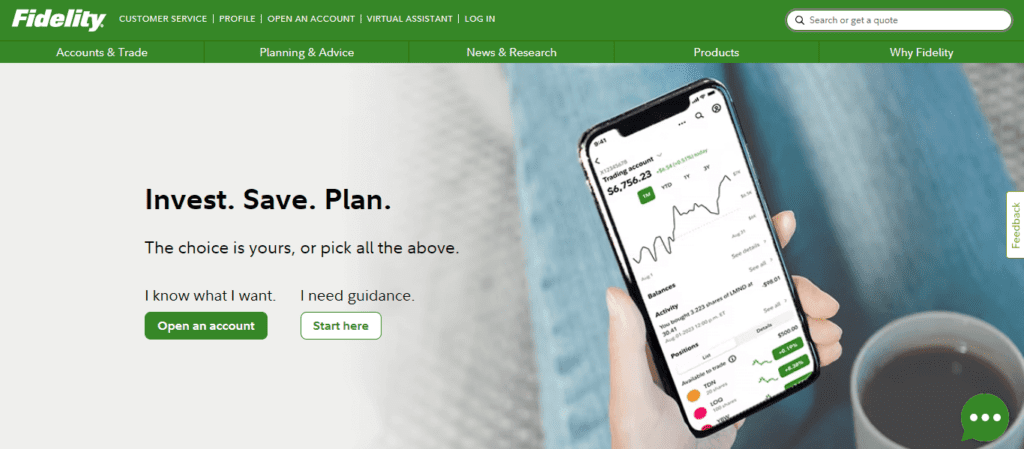Webull and Fidelity are notable platforms that offer investment and brokerage services with advanced trading tools. How do they work, and what features make them attractive to investors?
Our experts with over 10 years of experience explore each brokerage’s features, security architecture, transaction cost, and general ease of use to see which best suits investors’ needs.
Comparison at Glance
| Features | Webull | Fidelity |
|---|---|---|
| Products and service offerings | Equity securities, stocks, options, exchange-traded funds (ETFs), and cryptocurrencies such as Bitcoin and Ethereum. | Equities, fixed-income securities, mutual funds, forex, ETFs, options, crypto, and stocks. |
| Account types | Cash and margin accounts, plus traditional and Roth IRAs for individual accounts. | Roth, SEP, and rollover IRAs, 401(k)s, with personal, business, and management accounts. |
| Trading fees | No commission trading | Stock, ETF, and bond trading is free of charge. |
| Minimum deposit | No minimum deposit. However, there is a $1 deposit for crypto accounts and a $2,000 deposit for margin accounts. | No minimum deposit except $2,500 for margin accounts. |
| Educational materials | Educational resources with research materials for fundamental and technical analysis and a strong investor dashboard. | Top-notch educational materials, technical trading tools, and fundamental analysis information. |
| Security | Two-factor authentication (2FA), 128-bit encryption, firewalls, and mobile security. | Firewalls, secure emails, strong encryptions, and round-the-clock surveillance. |
| Device compatibility | Mobile, desktop, and website. | Website and mobile application. |
Overview of Webull

What are the main features? Webull is a general investment platform that offers several products and services, such as equities, ETFs, periodic mutual fund investing, and cryptocurrencies, to meet the needs of retail investors across the United States, the United Kingdom, and Asia.
What are the trading fees like? Webull has a standard 0.025% trading fee. It has zero commission fees with no minimum deposit for account holders. However, a $1 and $2,000 deposit is mandatory for cryptocurrency and margin trading respectively.
What are the supported investment products? Webull supports mainly U.S. stocks. Other products, such as cryptocurrencies, IRAs, and exchange-traded funds, are limited.
What are the available security measures? To keep customers’ accounts safe, Webull uses a combination of two-factor authentication, 128-bit encryption, phone security, and firewalls.
What is the minimum trading amount? Webull’s minimum trading amount is not specific, but a minimum of $2,000 is required for margin trading.
Available locations: Webull appeals to the younger generation of investors and is available in the U.S., U.K., and selected locations in Asia.
Pros:
- It has extended trading hours.
- Zero platform fees
- No commission fees except for the 0.025% standard fee.
- No minimum account amount except for margin accounts.
Cons:
- Supports only U.S. stocks.
- Limited investment products.
- Non-availability of tax-efficient accounts.
- Extra foreign exchange fees may be required.


More details
Webull is a dependable crypto exchange platform with low fees, suitable for both novice and seasoned investors. Its sleek desktop and mobile interface makes it attractive to all traders. However, its educational resources are limited, possibly making it less ideal for beginners.
-
Smooth account-opening process.
-
No fees on cryptocurrencies, stocks/ETFs, options.
-
Offers extended hours and pre-market trading.
-
Research tools
-
Flimsy educational support.
-
Backward portfolio options.
-
No live chat.
Overview of Fidelity

What are the main features? As a full-service brokerage with advanced trading tools, Fidelity offers products such as local and international stocks, fractional shares, mutual funds, options, futures trading, and other fixed-income securities. With over eight decades in active business, the platform is now a household name amongst investors with diversified portfolios.
What are the transaction fees like? Trading IRAs, stocks, fractional shares, and ETFs on Fidelity is free of charge. It, however, charges an additional $0.65 per contract for options trading. Cryptocurrency transactions attract less than a 1% spread.
What are the supported investment products? Fidelity supports a wide range of investment products such as stocks, ETFs, IRAs, 401(k)s, mutual funds, crypto, and options, providing more innovative ideas for its customers.
What are the available security frameworks? As part of its security layout, Fidelity provides customers with the option of 2FA, firewalls, and phone security.
What is the minimum deposit required? Fidelity pegs its minimum account amount at $0. However, a minimum of $2,500 is mandatory for stock and ETF margin trading.
Available location: Fidelity offers its users significant growth potential while spreading its tentacles across 25 different countries in Australia, Europe, North America, Asia, and Africa and supporting 16 currencies.
Pros:
- Low-cost trades.
- Great trade execution
- Extensive educational and research sources, plus fundamental tools and portfolio calculators.
Cons:
- Option fees are higher than other competitors.
- Futures and commodities are absent.
- Exchange-assisted trading attracts higher fees.
Webull vs Fidelity: Company Overview
Launched in 2017 as a relatively new online brokerage, Webull appeals to young investors. It just began business in the U.K. in 2021 and launched the Webull U.K. app in 2023 under the regulation of the Financial Conduct Authority (FCA). The platform has over 17 million users globally.
Fidelity, on the other hand, was launched in 1943 and offers several investment vehicles. With over 42 million users, and $11.1 trillion and $4.2 trillion in administrative and discretionary assets, Fidelity is popular among Generation X and millennials. They are currently with operations in over 25 countries.
Fidelity vs Webull: Features
Both Webull and Fidelity are suitable for investors who want to explore the financial market without minimum account deposits and low trading fees. They offer similar investment products. However, Webull is not fully serviced. Besides the U.S.-only stocks, other products are limited, and investors must manage their portfolios.

Fidelity’s service offerings are vast, giving investors access to different stocks, ETFs, options, mutual funds, and cryptocurrencies. As the largest brokerage in the U.S., it keeps infusing innovative functions such as dashboards and advanced trading tools into its online platform.
Webull vs Fidelity: Transaction fees
Both Webull and Fidelity rank highly as some of the best platforms with zero commission fees. They have a $0 minimum account amount, making them the best platforms investors can leverage to enter the market. However, Webull and Fidelity require a minimum balance of $2,000 and $2,500 for margin trades.
Generally, both platforms have other fees that investors are mandated to pay. The table below compares the fees of Webull and Fidelity.
| Fees | Webull | Fidelity |
|---|---|---|
| Online trades for ETFs, equities, or OTC | No-commission | No-commission |
| Options | No-commissions but likely a standard 0.025% fee | $0.65 per contract |
| Cryptocurrency trading | No-commission; only network fees | Only network fees |
| Margin trades | 9.49% for trades under $25,000. Fees reduce as the margin trade amount increases. | 13.57% for trades under $25,000. Fees are inversely proportional. |
| ACH deposits/withdrawals | Free | Free |
| Wire transfer (deposit) | $8 for U.S. customers and $12.5 for international customers. | Free for domestic wires. |
| Wire transfer (withdrawal) | $25 for U.S. customers and $40 for international customers. | Free for domestic wires. |
| Statement of account charges | $5 and another $2 for each confirmation | Free |
| Prospectus mailing fee | $2.5 per mail | Free |
| Inactivity fee | N/A | Free |
Webull vs Fidelity: Security
Security must be prioritized, with Webull and Fidelity having millions of users and sophisticated technical analysis tools. While neither has experienced any security breaches, outages, or data leaks, the platform has implemented security strategies, such as two-factor authentication, phone security, encryption, and firewalls.
Both regulated by the SEC and other regulatory bodies, they leverage the Securities Investor Protection Corporation (SIPC) and other insurance policies to guarantee customers’ investments.
Fidelity vs Webull: Ease of Use
Webull and Fidelity have intuitive user interfaces that make navigating mobile, website, and desktop platforms easy. While Fidelity’s mobile app has advanced features, Webull’s gives a modern feel since it was built only six years ago. Setting up an account is simple; the information required for verification are email addresses, social security numbers, proof of address, and identity cards.

To simplify the investment process and manage portfolios, both platforms have educational and research amenities and technical indicators to broaden investors’ knowledge.
Some of these include stock screeners, ETF and mutual funds evaluators, options screeners, charts, calculators, portfolio management tools, and more. However, Webull doesn’t come close to Fidelity’s vast library and investment advice.
Webull vs Fidelity: Customer Service
Both platforms offer great customer support. Traders can reach customer service via email and live chats and use the frequently asked questions (FAQs) materials on the websites. Fidelity offers a valuable customer experience by supporting users in opening multiple trade tickets and sending multiple orders simultaneously.
Webull offers customers referral bonuses and other perks to encourage frequent trading. Users who refer a friend earn two stocks valued between $8 and $1,600. While Webull offers extended trading hours, Fidelity customers can also walk into nearby brick-and-mortar locations to get the required support.
Final Verdict

While Webull steadily climbs up the ladder, offering several investment products, maximum security, and relatively low trading fees, Fidelity remains a step ahead. The platform has paid its dues, offering unique features and products that befit its status as the largest brokerage firm in the United States. It also ranks as the top platform with long-term investors and more active traders.
The Winner: Coinweb chose Fidelity because of its relatively low fees, security, and vast investment options. It is one of the top online investment platforms, and it presents abundant educational and technical resources to its global investors.
The major downside of Webull as a brokerage firm is its support for only U.S. stocks and its limited investment offering. This is because the company is still new and growing.
Yes, Fidelity is better than Webull because it supports several investment products, 25 global exchanges, 16 currencies, and vast educational and technical resources to support active trading.
Webull is a trusted broker as it is regulatory compliant, transparent, and secure.
Fidelity enhances security through the use of two-factor authentication, firewalls, passcodes, and phone security.
Both Fidelity and Webull have relatively low fees. However, Fidelity does not charge for the most basic things such as statements, confirmations, prospectus, or mailing.








